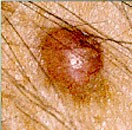
THURSDAY, Aug. 20, 2015 (HealthDay News) — People who have many moles are at increased risk for melanoma skin cancer, but people with fewer moles may be more likely to develop a more aggressive form of the disease, a new study suggests.
Melanoma is the deadliest type of skin cancer.
For the study, researchers analyzed medical records of 281 melanoma patients: 89 had more than 50 moles and 192 had fewer than 50 moles.
Patients with fewer moles had thicker, more aggressive melanoma and were more likely to be diagnosed at a later age than those with more moles, according to the study scheduled for presentation Thursday at an American Academy of Dermatology meeting in New York City.
Doctors may be more likely to educate patients with a large number of moles about their increased risk of developing melanoma, said study author Dr. Caroline Kim. Kim is director of the pigmented lesion clinic at Beth Israel Deaconess Medical Center and an assistant professor of dermatology at Harvard Medical School in Boston.
As a result, people with many moles may be more likely to get regular skin exams, which means their melanoma would be detected at an earlier stage, when it is thinner and less aggressive, she explained.
Biology may also be a factor.
“We already know that melanomas are not all the same genetically,” Kim said in an academy news release.
“It’s possible that there are different pathways that drive melanoma in these two patient groups, resulting in different degrees of aggressiveness. If patients with fewer moles are more prone to aggressive melanoma, then we need to make sure that they are also being educated and screened, in addition to patients with many moles,” she suggested.
The data and conclusions of research presented at medical meetings should be viewed as preliminary until published in a peer-reviewed journal.
Further large-scale research is needed to confirm results of this study, Kim said.
More information
The U.S. National Cancer Institute has more about melanoma.
Copyright © 2025 HealthDay. All rights reserved.

